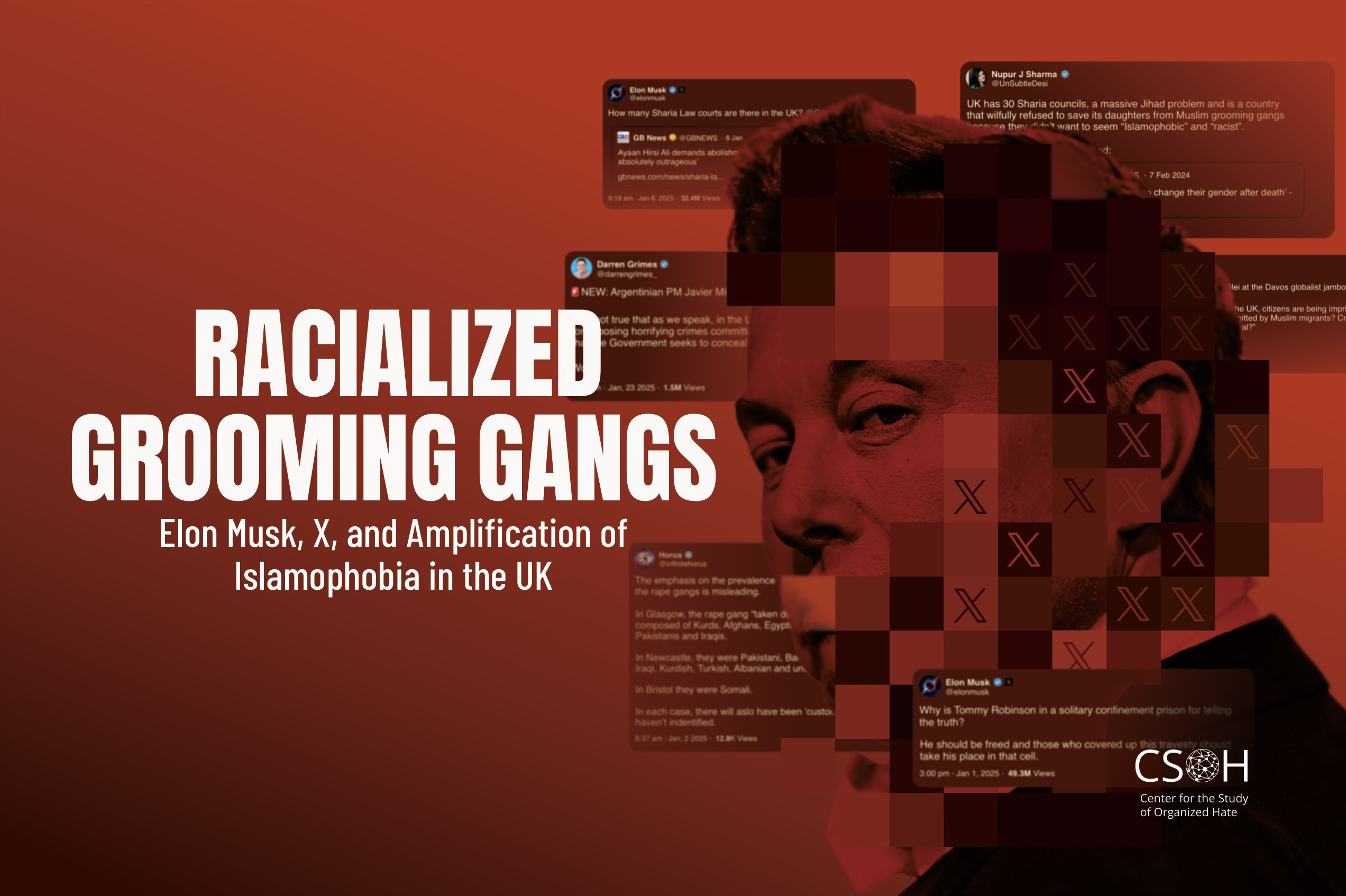Executive Summary
The 2025 discourse around ‘grooming gangs’ in the UK, in which South Asian men (in particular Pakistani Muslim men) are alleged to be collectively responsible for sexually abusing white women and girls, resulted in the amplification of Islamophobic and racialized narratives across the country. This intensification of Islamophobia relied on two key factors: 1) baseless and historically rooted harmful stereotypes about Muslims, and especially Muslim men, in the UK and 2) the social media platform X (formerly Twitter) and in particular Elon Musk’s centrality in the sharing and foregrounding of these ideas via X, along with several global key actors (outlined in detailed below). This report specifically examines Musk’s role, the centrality of X, along with key actors on the platform, and the wider implications of the ‘grooming gangs’ narrative on Islamophobia and broader community cohesion in the UK.
The UK ‘grooming gangs’ controversy is being actively reshaped by powerful digital actors who use their platforms to redirect public attention towards racist conspiracy theories. Willfully ignoring systemic child protection failings centres a conspiratorial moral panic, weaponized to target Muslims, British Pakistanis, South Asians, and immigrants. Under Musk’s leadership, X has enabled the proliferation of this racially charged discourse – and even legitimized extremist rhetoric under the guise of “free speech.”
The ‘grooming gangs’ discourse online coalesces around three core themes: 1) racialized scapegoating of Muslim men, 2) allegations of institutional cover-up, and 3) attacks on British multiculturalism. The scapegoating of Muslim men (particularly British Pakistani men) relies on long-standing orientalist and racist tropes to frame them as collectively (and sometimes solely) responsible for sexual violence. The myth of institutional cover-up alleges that authorities—including the Labour Party, judiciary, and media—deliberately concealed crimes to protect minority communities or preserve political advantage. The aforementioned constructs multiculturalism and so-called “political correctness” as conduits to such crimes, thus positioning diversity itself as a threat. Together, these sensationalist conspiracies serve to racialize sexual criminality, delegitimize and erode public trust in liberal public institutions.
The ‘grooming gangs’ discourse gained renewed widespread traction after Musk’s engagement with the issue on X in early January 2025. This was part of a broader pattern of his increasing alignment with far-right actors globally. Since acquiring X in 2022, Musk has dismantled trust and safety systems, reinstated and actively engaged with previously banned far-right X accounts. His anti-government messaging during crises—such as the 2024 Southport riots—has given cover and a pseudo-legitimacy to extremist actors while simultaneously weakening public trust in institutions. Furthermore, Musk’s centrality here has relied on both his algorithmic privilege and the convergence of an extensive global Islamophobic social media network spanning the UK, Europe, the US, and particularly India.
The ‘grooming gangs’ discourse must also be understood as part of the global far-right’s broader search for political legitimacy in a post-2024 UK. Following the decline of the Conservative Party, far-right actors have repositioned themselves as the “persecuted voice” of a silenced majority, thus adopting a martyr narrative. Musk’s influence over digital infrastructure has become a critical tool in this project, enabling the viral spread of narratives that racialize crime, normalize Islamophobia, and undermine multicultural democracy.
The report finds a glaring failure by X to meet its obligations under the UK’s Online Safety Act. Despite repeated violations of provisions concerning the incitement of racial or religious hatred and the risk of foreign interference in the UK’s political discourse, X has neither acknowledged nor acted on its responsibility to curb the spread of harmful content.
Key Findings
- CSOH documented and analyzed a total of 1,365 posts on X (formerly Twitter) pertaining to the ‘grooming gangs’ discourse and the broader racialized panic in the UK. The total engagements for these posts were calculated by summing views, likes, reposts, replies, and bookmarks.
- Of the 1,365 posts on X, 157 were published between January 1 and December 31, 2024, while the remaining 1,208 were posted during the peak discussion period from January 1 to January 30, 2025.
- The dataset received 1.51 billion views, 11.50 million likes, 3.17 million reposts, 625.18K replies, and 347.04K bookmarks, with a total engagement of 1.53 billion.
- 51 X posts by Elon Musk around the ‘grooming gang’ discourse received a total engagement of 1.2 billion.
- Islamophobic and racist posts promoting hatred against Muslims, British Pakistani men, other South Asians, and immigrants dominated the discourse, accounting for 650 out of 1,208 posts (53.81%) on X in January 2025. The discourse repeatedly links ‘grooming gang’ crimes to entire ethnic and religious groups.
- A total of 578 posts (47.85%) alleged that authorities deliberately concealed crimes to prevent public backlash and protect the Labour Party’s voter base.
- Of the 578 posts alleging an institutional cover-up, 45.5% placed blame on the Labour Party, 13.5% on the judiciary, and 9.6% on the media.
- A smaller portion—123 posts (10.18%)—argued that diversity and progressive policies promoting multiculturalism contribute to crime and societal decline.
- Posts by India-based Hindu nationalist accounts comprised 9.6% of the dataset, with 116 posts. The majority of their content promoted hatred towards British Muslims.
Note: Given the complexity of disaggregating intersectional data, a single post counted under one theme may also be counted under another if it contains content relevant to multiple themes.
Methodology
This report employs a combination of quantitative and qualitative methods to track online discourse surrounding ‘grooming gangs’ on X. The data for this study was collected in the periods between January 1-December 31, 2024, and January 1-January 30, 2025, when the conversation around this subject peaked following Elon Musk’s engagement with the topic.
The posts were gathered using X’s Advanced Search feature, applying specific keywords and Boolean combinations to ensure comprehensive coverage. Search terms included variations of ‘grooming gang’, “Muslim grooming gang”, “UK grooming gang” and references to specific locations associated with past cases (e.g., Telford, Rochdale, Rotherham, Oxford). Prominent figures linked to the ‘grooming gangs’ discourse–like X owner Elon Musk, English Defence League (EDL) co-founder Tommy Robinson, and associated X accounts, amplified by Musk and Robinson–were also included in the sample.
Through this process, we collected 157 posts from January 1, 2024 to December 31, 2024, including only those with at least 500 views each. This provided a comparative baseline to assess shifts in engagement and thematic focus before and after Musk’s interaction with influential posts on the topic on January 1, 2025. Subsequently, between January 1 and January 30, 2025, a total of 1,208 posts were identified. To refine the dataset, a snowball sampling method was employed, tracking accounts that frequently engaged with or amplified these narratives.
Given the differential levels of engagement with the identified datasets, different selection criteria were applied to the two time frames in our study. For the 2024 dataset, we imposed a minimum threshold of 500 views per post due to lower engagement levels on this topic during that period, resulting in 157 posts that met our criteria. For the January 2025 dataset, we employed a more inclusive approach to capture the full spectrum of the discourse that emerged following Musk’s intervention. While this methodological difference prevents direct comparisons of post volumes between periods, the scale of engagement differential observed renders this limitation largely inconsequential to our core findings. The January 2025 dataset shows engagement metrics that are orders of magnitude higher than the 2024 baseline: 1.53 billion total engagements across 1,208 posts in January 2025 compared to the much smaller engagement footprint in 2024. This extraordinary contrast in engagement volumes indicates a genuine shift in discourse rather than an artifact of our sampling approach.
This allowed for the mapping of engagement and content dissemination patterns, identifying key actors that contributed to the spread of the ‘grooming gangs’ narrative. The total dataset contains 1,365 posts. Engagement here refers to cumulative interaction with posts, which is a sum of views, likes, reposts, replies, and bookmarks.
We further categorized the 1,208 posts from the January 2025 dataset into four major themes: Islamophobia and racism, institutional cover-up, multiculturalism and political correctness, and mixed and peripheral discussions. As one post could be categorized under multiple themes, instances of thematic overlap were observed. The percentage distribution for each theme was calculated using the total of 1,208 posts as the baseline.
Data Analysis
On January 1, 2025 at 3 PM Eastern Standard Time (8 PM GMT), Musk quote-tweeted a post from the X account @InevitableWest, which claims to operate from the UK. The account had posted about Tommy Robinson’s arrest, demanding an apology on his behalf for allegedly labeling him a “far-right racist” while Robinson was exposing what the account described as the “mass betrayal of English girls”.
The post had only moderate traction until Musk’s quote-tweet, which significantly boosted its visibility. It eventually reached 41.4M views, 47K likes, and 9.3K reposts. Musk’s own quote-tweet—suggesting an institutional cover-up of these claims—amassed 49.24M views, 284K likes, and 60K reposts. Later that day, between 6 PM and 7 PM EST (11 PM – 12 AM GMT), Musk quote-tweeted three additional posts about alleged ‘grooming gangs’. One of these posts, from @visegrad24, explicitly used the term “Muslim grooming gang”, while another, by @MarioNawfal, cited a BBC article and blamed “Pakistani men.” Musk’s engagement with these posts triggered a wave of discourse on ‘grooming gangs’, amplifying Islamophobic and racist sentiments.
Over the next 30 days, Musk continued posting about the issue, accumulating 1.19B views, 6.87M likes, 1.41M reposts, 383.94K replies and 168.9K bookmarks. In the dataset analyzed, his 51 posts alone generated a total engagement of 1.20 billion. This surge in activity persisted until January 28, 2025. The CSOH dataset, which tracked 1,208 posts during this period, documented the surge, on January 8—just days after Musk’s initial posts. By the end of the month, these 1,208 posts, including Musk’s 51 posts, had amassed 1.51B views, 11.50M likes, 3.17M reposts, 625.18K replies, and 347.04K bookmarks, with a total engagement of 1.53B.
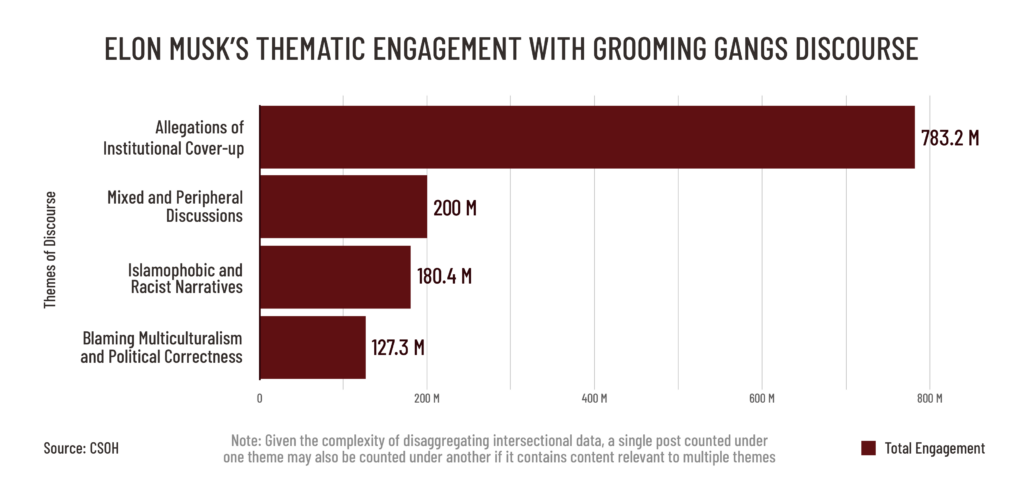
This represents a dramatic contrast to the preceding year (January to December 2024), when only 157 posts on the topic—each exceeding 500 views—were recorded. While the January 2025 period contained approximately 7.7 times more posts than the entire previous year (1,208 vs. 157), the engagement metrics show an even more striking disparity.
The January 2025 posts generated a total engagement of 1.53 billion, which is nearly 93 times greater than the 16.49 million total engagement accumulated throughout all of 2024.
This disproportionate increase in engagement relative to post volume demonstrates the significant amplification effect that occurred following Musk’s intervention in the discourse.
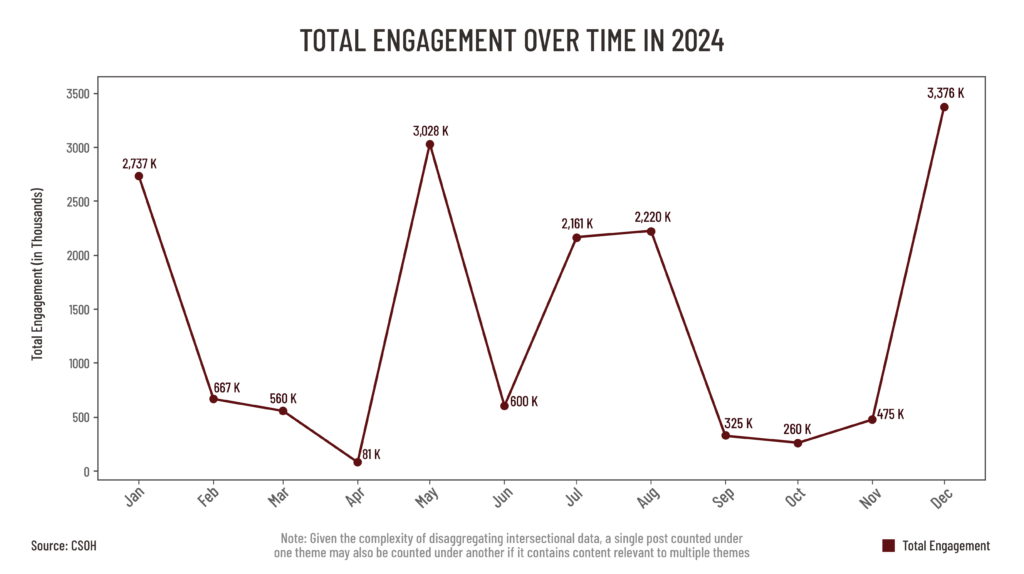
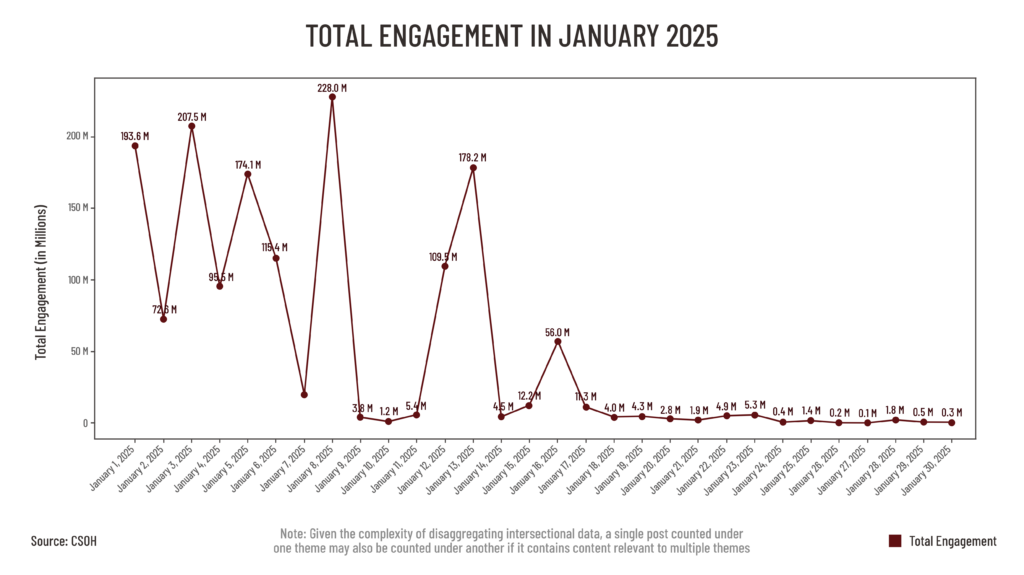
The ‘grooming gangs’ discourse can be categorized into distinct themes: 1) Islamophobia and racism, 2) institutional cover-up, and 3) multiculturalism and political correctness. The most prominent, comprising 53.81% of the dataset (650 posts), centered on hatred against Muslims, men of British Pakistani heritage, other South Asians and immigrants, amassed 362.7M views, 3.9M likes, 1M reposts, 201.8K replies and 163.9K bookmarks with a total engagement of 368M. The narrative of an institutional cover-up was also dominant, accounting for 47.85% of posts (578 posts) with 1.2B views, 8.8M likes, 2.5M reposts, 381.1K replies and 483K bookmarks. Around 123 posts (10.18%) blamed multiculturalism and political correctness, garnering 119.9M views, 768.1K likes, 144.6K reposts, 28.8K replies, and 8.6K bookmarks with a total engagement of 120.9M. An additional 214 posts (17.71%), which covered a range of themes that were categorized as mixed and peripheral discussions covered ‘grooming gangs’ but didn’t fit within a specific theme. The posts in this category received 299.4M views, 1.5M likes, 380K reposts, 185.2K replies and 62.3K bookmarks, with a total engagement of 301.6M.
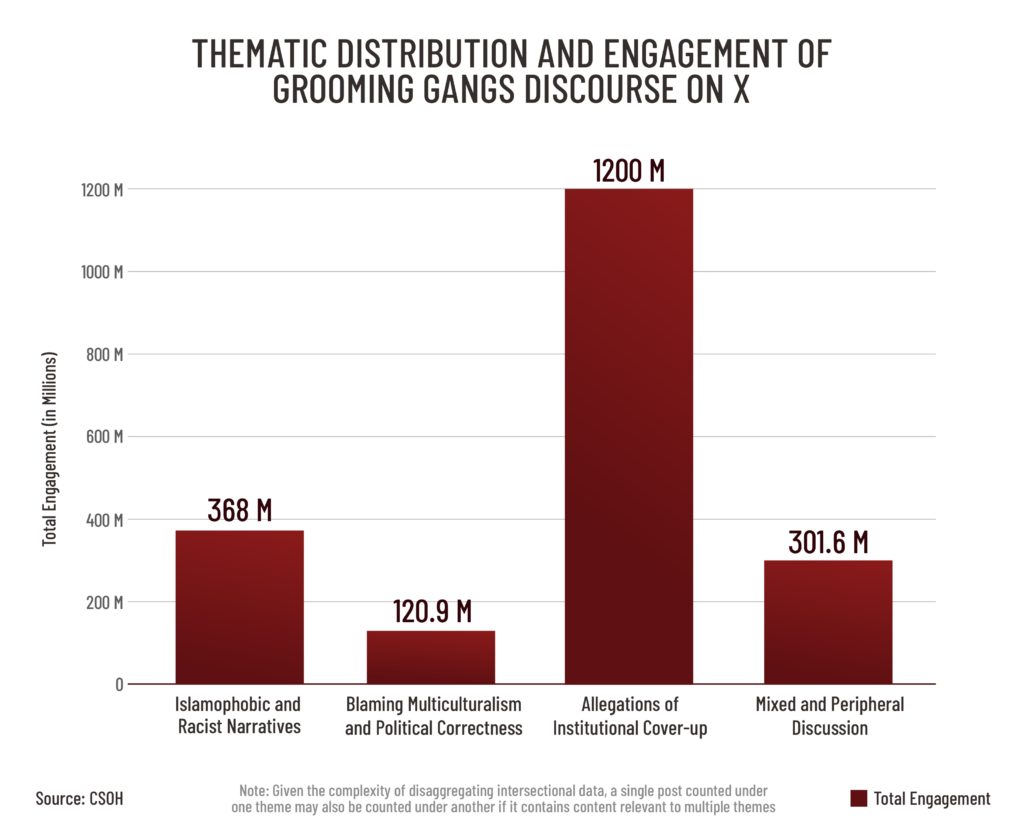
Discourse Analysis
Thematic analysis was employed to examine the dataset’s content and underlying trends to identify dominant discussions around ‘grooming gangs’ on X.
A qualitative discourse analysis was conducted to assess how narratives were framed online, and the role of influential X accounts in shaping engagement around this subject. The dataset was examined for recurring themes, which emerged based on observed patterns in how blame was assigned, which groups were targeted, and the ideological positioning of claims. These themes included:
- Islamophobic and racist narratives against Muslims, men of British Pakistani heritage, other South Asians and immigrants: Framing these communities as collectively responsible for ‘grooming gangs’.
- Allegations of Institutional Cover-up: Allegations that various authorities and the media deliberately concealed or downplayed crimes.
- Blaming Multiculturalism and Political Correctness: Positioning the emergence and activities of ‘grooming gangs’ as a consequence of liberal policies.
- Mixed and Peripheral Discussions: This category includes posts that did not neatly fit into the primary themes outlined above. It encompasses a wide range of content, including critical news commentary and specific or localized discussions that lacked the coherence or volume to form standalone thematic categories. This section contains a diverse mix of both hateful and non-hateful content, reflecting the fragmented and sometimes contradictory ways the ‘grooming gangs’ discourse is engaged with online.
The discourse on ‘grooming gangs’ is deeply entwined with larger societal anxieties about race, immigration, and cultural identity. These debates do not exist in a vacuum; rather, they reflect broader political and ideological struggles, where the framing of crime is often weaponized to serve specific narratives. In many cases, the focus on these crimes has less to do with justice for victims and more to do with reinforcing racialized fears and maintaining cultural hierarchies.
Download the full report via the link above.
